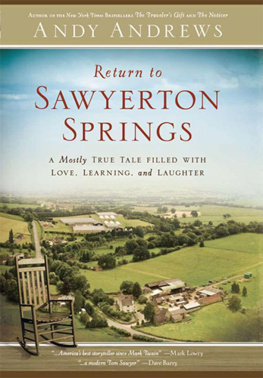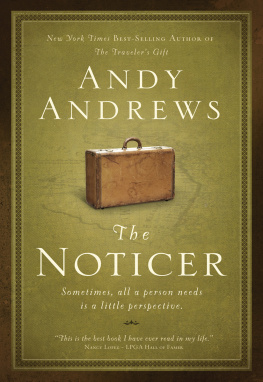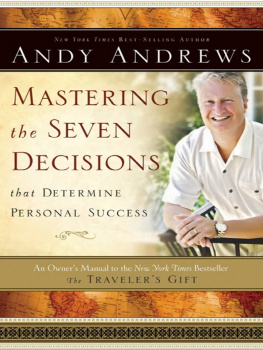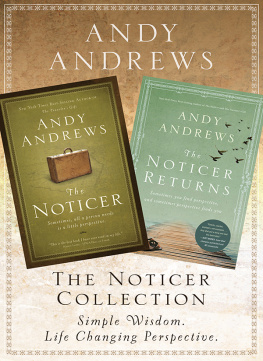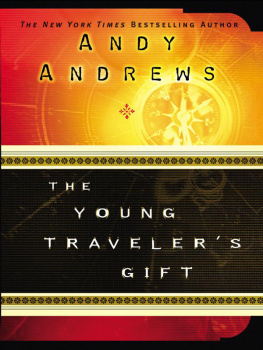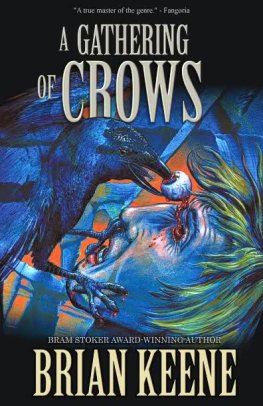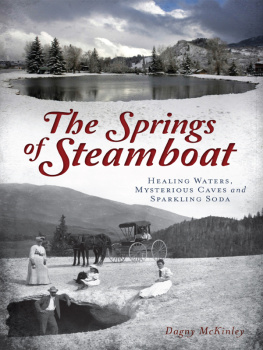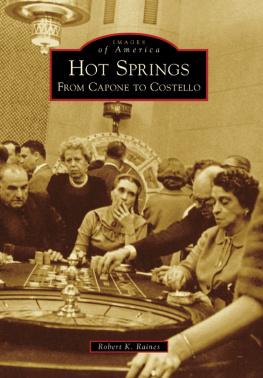
To learn more about Andy Andrews,
or to book him for your next speaking event,
visit: www.AndyAndrews.com
OTHER BOOKS BY ANDY ANDREWS
The Travelers Gift
The Lost Choice
Island of Saints
The Noticer
Socks for Christmas
The Butterf ly Effect

Copyright 2009 by Andy Andrews
Published by Hansen House, Inc., Newport Beach, California (949) 764-2640
All rights reserved. No portion of this book may be reproduced, stored in a retrieval system, or transmitted in any form or by any means-electronic, mechanical, photocopy, recording, scanning, or other-except for brief quotations in critical reviews or articles, without the prior written permission of the publisher.
Cataloging Information available from the Library of Congress
ISBN: 978-0-9819709-1-2
12 11 10 09 4 3 2 1
1st edition, September 2009
Printed in the United States of America
CONTACT ANDY
To book Andy for corporate events, call:
(800) 726-ANDY (2639)
For more information, go to:
www.AndyAndrews.com
Dedicated to Kevin and Glenda Perkins.
To remain best friends from childhood,
through high school, college, and adulthood
is a rare thing indeed.
I am honored to know you.
Table Of Contents
THROUGH THE YEARS, I HAVE BEEN DESCRIBED BY FRIENDS and family as an optimist and a pessimist. I have been labeled focused and disorganized. Once, my wife publicly praised my ability to compromise on the same day she later criticized me for having a stubborn nature.
Here and now, I confess that it is all true. I am calm and hotheaded, observant and oblivious, a master of my emotions and a blubbering mess. I am a man who has reached this point in my life without medication or incarceration. I consider myself normal in every sense of the word. I am neither a great success nor a slovenly failure. I am happy except when I am sad, energetic except when I am tired, and patient with my children... except when I am not.
In what many call the middle-aged years of my life, I have become comfortable with the idea that I am a walking contradiction. On occasion, I am even proud of the fact. But there is no doubt in my mind that my hometown is to blame. They made me what I am. And I am not alone!
Amazing, isnt it? Our hometowns have sent us into the world with mispronunciations, odd habits, and predetermined beliefs about ourselves and each other. And we have storiesstories we tell and retell about the people with whom the fabric of our lives was inexorably woven.
Sawyerton Springs, Alabama, is such a place. It is more memory to me now than geographic location, though I occasionally visit to catch up on the kind of news that never seems to make it to Yahoo or MSN. Who died, who got married, what happened at the wedding that you will not believe... those kinds of things.
The town is not famous. In fact, it is missing from several state maps. There is nothing there that is the biggest or the best or the first of anything. There is, on second thought, a last distinction held by Sawyerton Springs...
Myra Fletcher had lived her entire sixty-eight years at the home in which she was born just outside of town. The two-acre lot bordered a wooded area where an artillery battle had been fought during the civil war. A point of pride for the Fletcher family had long been the cannonball stuck high up in an old oak tree where it could be plainly seen. Over time, a limb had grown from the spot, making the large sphere more and more visible.
It was a blustery March morning when the cannonball finally fell. Myra (everyone assumed when they found her) had been raking leaves under the oak when she was fatally struck on the head by what was later determined to be a twelve-pound ball of iron. It wasnt until the funeral two days later that everyone realized that Myra Regina Fletcher had become the last official casualty of the Civil War... in 1974.
I grew up in Sawyerton Springs. I have somehow repressed much of what happened during those years and have rarely, if ever, related these memories. Why, I do not know. I hope it is not embarrassment, though if I were entirely honest that might be a factor. No one can bring down a cloud of mortification like those who know us best.
And they do know me there. This was the place I learned to shake hands with a firm grip and look a person in the eye when you do it. Someone in this small town that raised me to be the man I now am remembers my first laugh, my first cry, and my first curse word. Of course, as one might expect, those memories are held over me, dangled occasionally for public consumption by the local keepers of humility.
The very week one of my books first hit the New York Times bestsellers list, I was reminded by the mayorfrom the podium at the Rotary Club luncheonabout the time Billy Pat Williams put down the word suit in the Rotarian Scrabble Tournament and I immediately jumped up and yelled, Su it? What kind of word is su it?
The message was clear... youre not any smarter than the rest of us.
Smart or not, as an author who is no longer under the gun or tied to a particular genre, I have taken a year to complete this written documentation of my hometown. I have included the communitys current activities in addition to my recollections of its past.
Dont expect this to be a complete or thorough history of my childhood or of Sawyerton Springs itself as I was determined to leave out the boring parts.
And I did.
Andy Andrews Orange Beach, Alabama


IN A TOWN WITHOUT A MOVIE THEATER OR FAST FOOD restaurant, basketball, and baseball. Weeks, months, and, yes, time itself revolves around the children, their practices and games. Most kids played all three sports, but at eleven years of age, I didnt weigh enough to play football and measurements for basketball had me at a lofty four feet five inches. It was baseball for me and had been for several years. This year, however, I was going to be a starter at second base.
As we milled around, one could easily pick out the kids from last years team: Lee Peyton, Kevin Perkins, Steve Krotzer, Phillip Wilson, Charles Raymond Floyd, and, of course, me. We all had on last years hats. They were off-white with a dark-blue bill and a big FNB on the front. First National Bank, our sponsor, would be giving everyone new hatswe knew that. But in the meantime, we wanted to be sure that our new coach could tell the veterans from the rookies.
None of us had met our new coach. His name was Mr. Simpson. He was, we were told, new to the area. New to the area and
new in town were two different things. If someone was new in town, that generally meant that he had moved from someplace we had heard of and was probably still within driving distance of his cousins. New to the area, however, was a hint that this person was from the North.
Living as we did, in the southern part of Alabama, North to me was Birmingham. At the time, I suppose I was somewhat suspicious of people from the North. To be certain, it was a tiny distinction, yet the phrase brought visions of Vikings and pillaging to my mind. This created an intense curiosity about Mr. Simpson almost a feeling of danger. After all, I had been told more than once that these people could be nice, but they were different. The word different was always articulated with a pause before it and with eyebrows raised.
Next page
